The Suffrage Cause and Bryn
Mawr - The British Lecturers
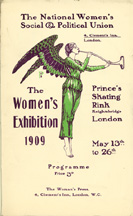 Like
the American suffrage movement, the British campaign had both radical and more
moderate branches. The National Union of Women's Suffrage Societies (NUWSS)
was founded in 1887 when seventeen separate suffrage organizations merged into
one larger group. The NUWSS, like the NAWSA in the U.S., used moderate and legal
strategies including petitioning, lecturing, publishing suffrage literature,
polling, and letter writing. The Women's Social and Political Union (WSPU),
founded in 1903 by Emmeline Pankhurst, was willing to use illegal, brazen and
sometimes violent methods, including civil disobedience and hunger strikes,
to draw attention to the issue of suffrage. Its main political strategy was
to oppose whatever party was in political power as long as that party hindered
the progress of women's suffrage.
Like
the American suffrage movement, the British campaign had both radical and more
moderate branches. The National Union of Women's Suffrage Societies (NUWSS)
was founded in 1887 when seventeen separate suffrage organizations merged into
one larger group. The NUWSS, like the NAWSA in the U.S., used moderate and legal
strategies including petitioning, lecturing, publishing suffrage literature,
polling, and letter writing. The Women's Social and Political Union (WSPU),
founded in 1903 by Emmeline Pankhurst, was willing to use illegal, brazen and
sometimes violent methods, including civil disobedience and hunger strikes,
to draw attention to the issue of suffrage. Its main political strategy was
to oppose whatever party was in political power as long as that party hindered
the progress of women's suffrage.
Anne Cobden-Sanderson (1853-1926)
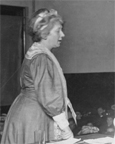 Anne
Cobden-Sanderson, a founding member of the British Women's Freedom League, was
known for her advocacy of the role of working class women in the suffrage movement.
Her 1907 address at Bryn Mawr, "Why I Went to Prison," was the first
lecture hosted by the campus's newly founded chapter of the College Equal Suffrage
League. Cobden-Sanderson was in the United States at the invitation of Harriet
Stanton Blatch (the daughter of Elizabeth Cady Stanton), introducing the American
suffrage community to British protest methods.
Anne
Cobden-Sanderson, a founding member of the British Women's Freedom League, was
known for her advocacy of the role of working class women in the suffrage movement.
Her 1907 address at Bryn Mawr, "Why I Went to Prison," was the first
lecture hosted by the campus's newly founded chapter of the College Equal Suffrage
League. Cobden-Sanderson was in the United States at the invitation of Harriet
Stanton Blatch (the daughter of Elizabeth Cady Stanton), introducing the American
suffrage community to British protest methods.
Beatrice Harraden (1864-1936)
On March 16, Miss Beatrice Harraden addressed us on 'A Woman Writer and the
Woman Movement.' Miss Harraden has been intimately connected with the English
militant movement from the beginning and at the end of the meeting answered
our questions in regard to it very informingly. Her desire was to impress
upon us that the driving force of English suffrage militancy is an ideal and
the urgent necessity for readjustment of existing conditions.
The Lantern, 1913
Beatrice Harraden spoke for the College Equal Suffrage League only two days
prior to the lecture given by Max Eastman. She was the author of many books
and her writings were often published in Votes for Women, published by
the Pethick-Lawrences.
Laurence Housman (1834-1959)
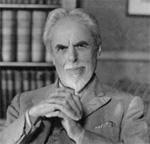 The
author, illustrator and dramatist Laurence Housman, one of the British militants,
spoke on "Feminism" on March 18, 1916. Housman, the brother of poet
A. E. Housman, helped found the Men's League for Woman's Suffrage in England
in 1907. Like its sister organization, the Women's Social and Political Union
(WSPU), the Men's League engaged in protest strategies that included civil disobedience,
destruction of property and hunger strikes. Among the suffrage pamphlets in
the library are Houseman's Sex-War and Woman's Suffrage, containing the
text of a speech given by Housman on May 7, 1912. In it Housman presents a radical
argument suggesting that the suffrage movement has highlighted a wide range
of social and legal injustices caused by institutionalized sexism, and that
it has energized women and sympathetic men to bring about drastic change.
The
author, illustrator and dramatist Laurence Housman, one of the British militants,
spoke on "Feminism" on March 18, 1916. Housman, the brother of poet
A. E. Housman, helped found the Men's League for Woman's Suffrage in England
in 1907. Like its sister organization, the Women's Social and Political Union
(WSPU), the Men's League engaged in protest strategies that included civil disobedience,
destruction of property and hunger strikes. Among the suffrage pamphlets in
the library are Houseman's Sex-War and Woman's Suffrage, containing the
text of a speech given by Housman on May 7, 1912. In it Housman presents a radical
argument suggesting that the suffrage movement has highlighted a wide range
of social and legal injustices caused by institutionalized sexism, and that
it has energized women and sympathetic men to bring about drastic change.
Emmeline Pankhurst (1858-1928)
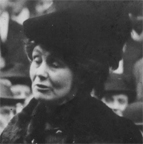 Emmeline
Pankhurst was one of the most recognizable names in the British suffrage movement
after the turn of the century. In 1903 Pankhurst and her two daughters, Christabel
and Sylvia, founded the radical Women's Social and Political Union (WSPU) in
reaction to the slow pace of progress in procuring the right to vote for British
women. Between 1907 and 1914, Emmeline and her daughters were repeatedly arrested
and during one eighteen month period, Emmeline engaged in ten hunger strikes.
However, after the outbreak of World War I in 1914, the WSPU ceased all militant
suffrage activities and re-focused its activities on helping with the war effort.
Emmeline
Pankhurst was one of the most recognizable names in the British suffrage movement
after the turn of the century. In 1903 Pankhurst and her two daughters, Christabel
and Sylvia, founded the radical Women's Social and Political Union (WSPU) in
reaction to the slow pace of progress in procuring the right to vote for British
women. Between 1907 and 1914, Emmeline and her daughters were repeatedly arrested
and during one eighteen month period, Emmeline engaged in ten hunger strikes.
However, after the outbreak of World War I in 1914, the WSPU ceased all militant
suffrage activities and re-focused its activities on helping with the war effort.
Pankhurst's visits to Bryn Mawr's campus in 1911 and 1916 demonstrated that
Thomas was willing to host a controversial figure at the College and that there
was an interested audience on campus. Pankhurst's status as an internationally
known figure and her own interest in accepting two speaking engagements here
also are indicative of Bryn Mawr's prominent place in the suffrage world.
 Frank
Moxon. What Forcible Feeding Means. London: The Women's Press, 1914
Frank
Moxon. What Forcible Feeding Means. London: The Women's Press, 1914
This booklet, printed by the publishing house associated with Pankhurst's WSPU,
belonged to Bryn Mawr alumna Mary Winsor '18, one of several College suffragists
to be imprisoned. Winsor's interest in such a pamphlet is one indication of
the influence the British militant movement had on radicals in the American
suffrage movement.
Read the entire book.
Frederick W. Pethick-Lawrence (1871- 1961)
 Frederick Pethick-Lawrence and his wife, Emmeline Pethick-Lawrence, co-edited
the radical suffrage newspaper, Votes for Women, and actively supported
the Pankhursts and the WSPU. Frederick could not officially be a member of the
all-female WSPU, but the couple's home became the site of WSPU meetings and
was known as a haven for suffragists returning from prison sentences. In 1912
both Frederick and Emmeline were arrested and sentenced to nine-month prison
terms for breaking store windows. Frederick Pethick-Lawrence is also credited
with helping to provide bail money for approximately 1,000 WSPU members.
Frederick Pethick-Lawrence and his wife, Emmeline Pethick-Lawrence, co-edited
the radical suffrage newspaper, Votes for Women, and actively supported
the Pankhursts and the WSPU. Frederick could not officially be a member of the
all-female WSPU, but the couple's home became the site of WSPU meetings and
was known as a haven for suffragists returning from prison sentences. In 1912
both Frederick and Emmeline were arrested and sentenced to nine-month prison
terms for breaking store windows. Frederick Pethick-Lawrence is also credited
with helping to provide bail money for approximately 1,000 WSPU members.
Photograph courtesy of Spartacus Educational
Ethel Snowden (1880-1951) and Philip Snowden (1864-1937)
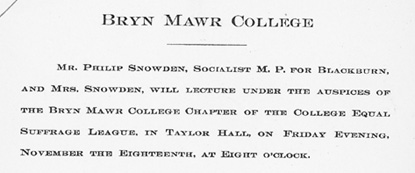 Ethel
and Philip Snowden visited Bryn Mawr at the request of the College Equal Suffrage
League. Both of the Snowdens were known for their interest in temperance, feminism,
socialism, and pacifism, and both wrote extensively on the social causes they
promoted.
Ethel
and Philip Snowden visited Bryn Mawr at the request of the College Equal Suffrage
League. Both of the Snowdens were known for their interest in temperance, feminism,
socialism, and pacifism, and both wrote extensively on the social causes they
promoted.
Philip was a long-time member in the Men's League for Women's Suffrage. He
was elected the on the Socialist (Labour) ticket in the House of Commons in
1906. Ethel was one of the most famous NUWSS speakers, and it was she who converted
Philip to a pro-suffrage stand. The January 1911 Alumnae Quarterly said
that Ethel had "a gift of oratory and wit characterized by a gentle irony,
and [was] a cogent as well as a charming speaker."
 Bryn Mawrters as Suffragists - The NCESL
Bryn Mawrters as Suffragists - The NCESL 

 Like
the American suffrage movement, the British campaign had both radical and more
moderate branches. The National Union of Women's Suffrage Societies (NUWSS)
was founded in 1887 when seventeen separate suffrage organizations merged into
one larger group. The NUWSS, like the NAWSA in the U.S., used moderate and legal
strategies including petitioning, lecturing, publishing suffrage literature,
polling, and letter writing. The Women's Social and Political Union (WSPU),
founded in 1903 by Emmeline Pankhurst, was willing to use illegal, brazen and
sometimes violent methods, including civil disobedience and hunger strikes,
to draw attention to the issue of suffrage. Its main political strategy was
to oppose whatever party was in political power as long as that party hindered
the progress of women's suffrage.
Like
the American suffrage movement, the British campaign had both radical and more
moderate branches. The National Union of Women's Suffrage Societies (NUWSS)
was founded in 1887 when seventeen separate suffrage organizations merged into
one larger group. The NUWSS, like the NAWSA in the U.S., used moderate and legal
strategies including petitioning, lecturing, publishing suffrage literature,
polling, and letter writing. The Women's Social and Political Union (WSPU),
founded in 1903 by Emmeline Pankhurst, was willing to use illegal, brazen and
sometimes violent methods, including civil disobedience and hunger strikes,
to draw attention to the issue of suffrage. Its main political strategy was
to oppose whatever party was in political power as long as that party hindered
the progress of women's suffrage. 




 Ethel
and Philip Snowden visited Bryn Mawr at the request of the College Equal Suffrage
League. Both of the Snowdens were known for their interest in temperance, feminism,
socialism, and pacifism, and both wrote extensively on the social causes they
promoted.
Ethel
and Philip Snowden visited Bryn Mawr at the request of the College Equal Suffrage
League. Both of the Snowdens were known for their interest in temperance, feminism,
socialism, and pacifism, and both wrote extensively on the social causes they
promoted. 

